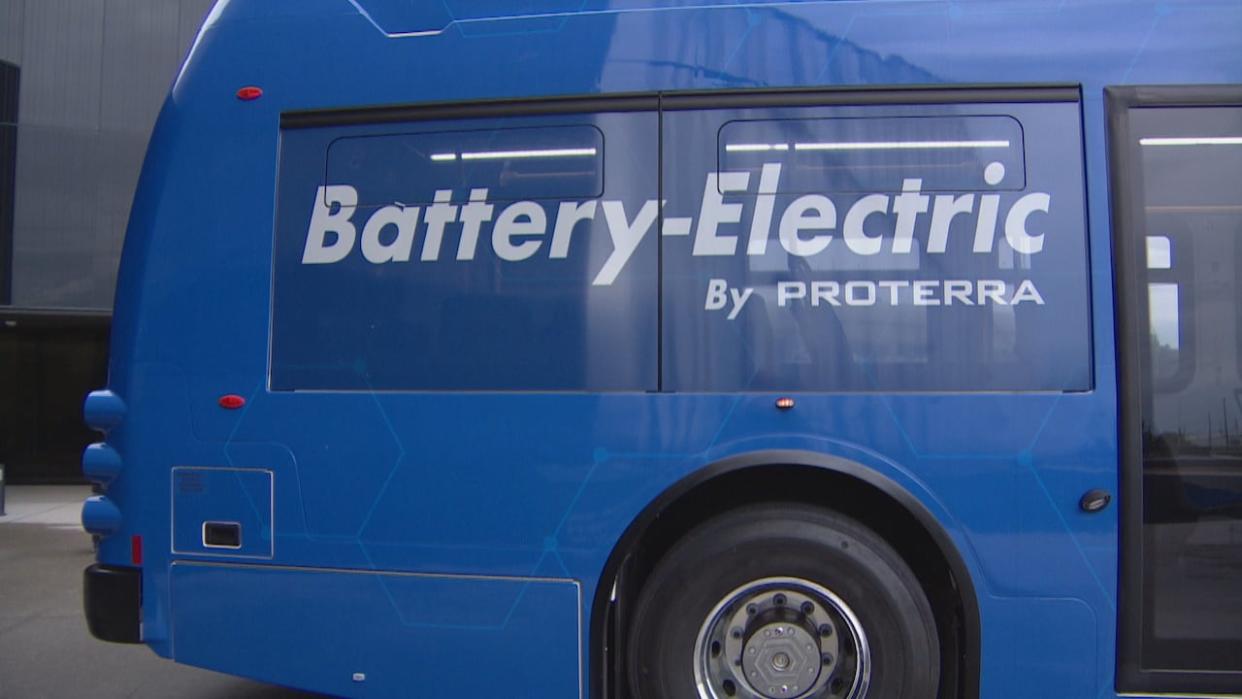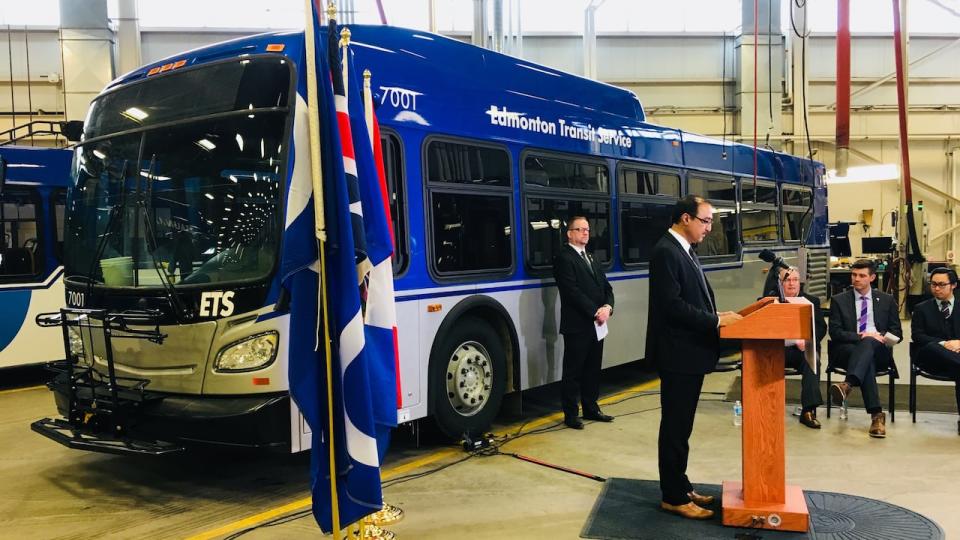Edmonton's fleet of electric buses failing amid manufacturer's bankruptcy proceedings

In the summer of 2020, Don Iveson, then Edmonton's mayor, announced that electric buses were being deployed by the city's transit service.
During a news conference at the Kathleen Andrews Transit Garage, Iveson said the new buses were quiet, "super-efficient" and "particularly efficient financially." Though they cost more upfront — upwards of $1 million each — they were to be about 30 per cent less expensive to service and maintain than diesel buses.
Three years later, most of the city's 60 electric buses aren't fit to be on the roads. And complicating the situation is the fact that manufacturer is in bankruptcy proceedings in the United States.
More than half of Edmonton's electric buses need replacement parts, according to Leigh McCabe, a maintenance representative with the Amalgamated Transit Union Local 569 and a heavy equipment technician who has worked on the electric buses.
"We've had some that have been down for over a year waiting for parts," he said.

Leigh McCabe, a heavy duty mechanic and transit union representative, says the electric buses have needed replacement transmissions and electric drivetrain motors. (Scott Neufeld/CBC)
Proterra, the buses' U.S. manufacturer, filed for Chapter 11 bankruptcy protection this summer and the City of Edmonton has an unsecured claim of more than $8 million US in deferred revenue.
In a court filing last month, the city's U.S. lawyers wrote that Edmonton's electric buses have failed to meet contract qualifications with respect to range, battery life, reliability and durability.
The document says the range of the electric buses is shorter than Proterra stated — "an issue that is exacerbated in Edmonton's cold winters" — and there have been problems with the software that controls the vehicles.
Because of these problems, the city has incurred damages of $1.3 million US, including hundreds of thousands of dollars in internal labour costs and replacement parts. The city also spent more than $200,000 on "battery blankets" to keep batteries warm and working.
A City of Edmonton spokesperson wouldn't comment on the legal matter except to say that the city will continue to take all necessary steps to preserve its rights in the bankruptcy proceedings.
Proterra, which is based in California, did not respond to an interview request.
A recent press release from the company says its products are designed, engineered and manufactured in the U.S.

In 2018, then-federal instructure minister Amarjeet Sohi spoke at a funding announcement that will see Edmonton purchase electric buses. (Emilio Avalos/CBC)
Problems with range, transmissions
On Monday, McCabe told CBC News that only 16 of the 60 buses were able to go on the roads that morning; the rest needed repairs.
In an October court filing, the city's lawyers said problems with the buses have caused them to be regularly out of service with deficiencies related to "poorly implemented design choices or poor craftsmanship and workmanship."
McCabe said that compared to clean diesel buses that arrived in the city around the same time in 2020, the Proterra buses have broken down more often.
Technicians have replaced a lot of transmissions and electric drivetrain motors, he said.
McCabe said he and his colleagues learned last week that they can no longer buy parts from Proterra because of the bankruptcy protection proceedings.
Cabs don't fit some drivers
Steve Bradshaw, president of ATU 569, said the union's biggest problem with the electric buses has been the cab configuration that only fits drivers who are of medium stature.
"A small person or a big person has a lot of trouble driving it," he said. "They just don't fit in that cab," he said.

Transit union president Steve Bradshaw says only bus drivers of medium height can drive the electric buses comfortably. (Scott Neufeld/CBC)
Bradshaw said the union filed a grievance over the issue and recently agreed on a solution with the city where drivers can avoid choosing shifts with electric buses.
Bankruptcy protection
Chapter 11 is a section of the United States Bankruptcy Code that allows corporations to reorganize their debts and keep their businesses alive.
In an outright bankruptcy, on the other hand, company assets would be sold, contracts would be broken and priority creditors in the U.S. would get paid first, said Vancouver lawyer Geoffrey Dabbs, who specializes in commercial and insolvency matters.
Dabbs said the City of Edmonton's lawyers in the U.S. are seeking $1.3 million US in advance — because of the problems with the buses — and assurances that contracts will be fulfilled.
"It really all depends on how things unfold with the other creditors and who is owed what, but the starting point right now is Edmonton might succeed in this," Dabbs said.
In recent weeks, Proterra has announced that divisions of its business have been sold to other companies, pending approval from the bankruptcy court.
Trouble for the industry?
Edmonton isn't the only Canadian municipality that bought electric buses from Proterra and has a stake in the bankruptcy proceedings.
In a recent court filing, BC Transit's lawyers said the company has been late in delivering 10 buses. BC Transit also found a number of deficiencies with the buses' manufacturing, chargers and infrastructure.
Bow Valley Regional Transit Services Commission, which serves the towns of Banff and Canmore and the improvement district surrounding Banff, has an unsecured claim of about $1 million US in the bankruptcy proceeding.
Adam Thorn, director of the Pembina Institute's transportation program, said Proterra's case raises concerns about the pace of electrification and, in particular, supply chain challenges. However, he said prospects for medium and heavy duty electric vehicles are still very good.
"We're seeing about an annual growth of about 33 per cent, which is I think a real reason to be optimistic about the industry as a whole," he said.

NAIT instructor Marin Sims predicts electric batteries will perform better in cold climates as technology improves. (Travis McEwan/CBC)
Martin Sims, an instructor with the Northern Alberta Institute of Technology's automotive apprenticeship program, said Edmonton's cold weather is tough on batteries.
"But I do think we'll overcome it as technology gets better and better," he said.


